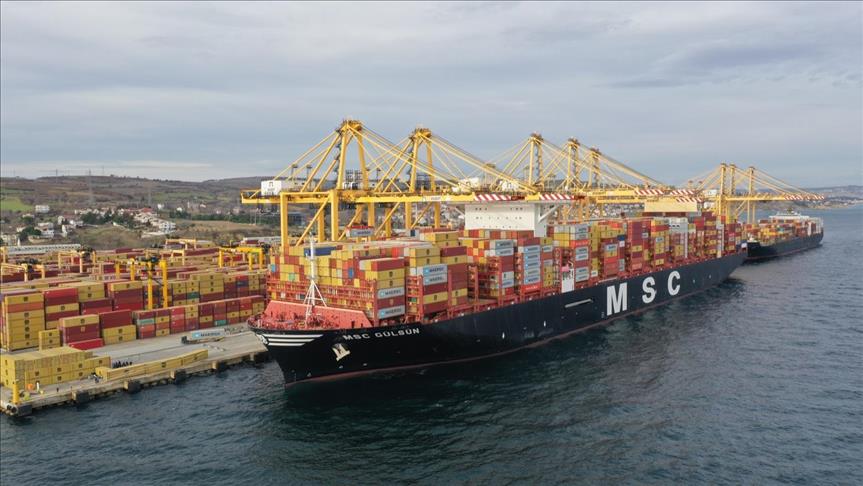The Geneva-based and world-leading transport and logistics company, Mediterranean Shipping Company (MSC), is actively involved in investing in sustainability with its target to reduce carbon emissions to net zero by 2050.
With its aim to accelerate the energy transition, the family company is decarbonizing its operations in the cargo business, which carries turbines, tanks and transformers for the energy sector.
Giles Broom, the global spokesman for the shipping group told Anadolu Agency about the company's ongoing commitments to decarbonization.
MSC is a significant consumer of the fuels it use to propel its fleet, while companies in the energy sector also use MSC’s shipping and inland solutions to move materials and equipment around the world.
The company has been laying the foundations for its commitment to net zero for decades and is currently exploring the development and deployment of low and zero-carbon fuels, energy conversion and efficiency technologies, as well as advancing work on a zero-carbon flexible-fuel concept vessel through partnerships.
Broom cited the example of its strategic alliance with Shell as a major energy provider to focus on developing a range of safe, sustainable and competitive technologies and fuel solutions as part of the energy transition of shipping.
MSC began adding its newest class of vessels in 2019- the "Gulsun Class" - to its fleet.
The Gulsun Class currently has 16 ships, which set a new standard in container shipping, in particular, in terms of environmental performance. At some 400 meters long and more than 60 meters wide, these vessels have an impressive capacity, and as bigger ships, generally emit less carbon per container carried, this helps companies to lower the carbon footprint of their supply chains.
- First LNG-capable vessels to operation in 2022
MSC will see the operation of its first LNG-capable vessels this year, and the addition of ammonia-ready vessels to the fleet as of 2025. MSC has also committed to having its first net zero fuel capable vessel in service by 2030.
"Our ongoing investments in research, trials and pilots are often conducted in partnership with others to support the production and scaling of low- and zero-carbon fuels and technologies. Some of these include the Methanol Institute, Hydrogen Council, Roundtable on Sustainable Biomaterials and the Sustainable Biomethane Alliance, and we also fill a leadership role in the Society for Gas as a Marine Fuel," Broom said.
- MSC's Türkiye operations
Türkiye is an important market for MSC, occupying a key geographic position between Europe, Asia and the Middle East and is a key hub for both ocean freight and intermodal operations.
MSC has been operating in Türkiye since 1995 and has over 1,000 staff in 15 offices across the country dedicated to serving the needs of Turkish customers. In addition to its offices and support staff, MSC has invested in port and logistics operations within the country through its ports and logistics arms – TiL and MEDLOG respectively.
MSCs logistics operations have been running in Türkiye since 2011, with depots, trucks and rail infrastructure offering a variety of inland transportation and logistics solutions. One of the company’s latest port acquisitions is Asyaport, located in the Tekirdag province in the Eastern Thrace region, which began operations in 2015 and has a capacity of up to 2.5 million twenty-foot equivalent unit (TEU).
According to Broom, being a 'good neighbor' to nature is a key focus for Asyaport, which targets sustainability in its port operations and environment.
This is realized by employing a range of energy-saving and carbon-efficient programs, including LNG-fueled in-port carriers, solar energy systems, waste collection and recycling, LED lighting and a dedicated 1.5-hectare green area in the port with a diverse range of trees and plants to encourage wildlife and create a thriving natural habitat within the port walls.
Thanks to all these initiatives, and its environmentally sensitive design, Asyaport has received a 'Green Port' certificate as part of the 'Green Port Project' conducted by Türkiye’s Ministry of Transport and Infrastructure.
- Climate change and MSC
In response to MSC's sensitivity to climate change, Broom said that tackling climate change is everyone’s responsibility.
"We take very seriously our opportunity to contribute to the decarbonization of global supply chains. As leaders in the sector, we aim to reduce emissions across our shipping and port operations, as well as addressing those of our inland logistics activities," he said.
He noted that the MSC Gulsun Class, introduced in 2019, is a great example of how to integrate energy efficiency measures into new ships
The company has also made significant energy efficiency improvements to its existing fleet through a massive retrofitting program. To complement these significant efforts to reduce emissions, MSC is also exploring alternative options such as hydrogen, ammonia, fuel cells, silicon, batteries and bio-methane.
"In 2021 we intensified our efforts towards our net-zero target by capitalizing on opportunities to accelerate the transition and make tangible progress today - such as using low-carbon fuels - while continuing research and development on the net zero-carbon energy sources that will fuel our vessels tomorrow," Broom said.
By Murat Temizer
Anadolu Agency
energy@aa.com.tr


